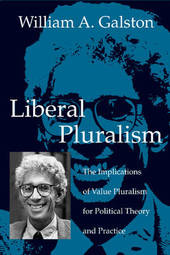
|
Liberal Pluralism: The Implications of Value Pluralism for Political Theory and Practice
Paperback / softback
Main Details
| Title |
Liberal Pluralism: The Implications of Value Pluralism for Political Theory and Practice
|
| Authors and Contributors |
By (author) William A. Galston
|
| Physical Properties |
| Format:Paperback / softback | | Pages:152 | | Dimensions(mm): Height 229,Width 151 |
|
| Category/Genre | Philosophy |
|---|
| ISBN/Barcode |
9780521012492
|
| Classifications | Dewey:320.51 |
|---|
| Audience | | Tertiary Education (US: College) | | General | | Professional & Vocational | |
|---|
| Illustrations |
Worked examples or Exercises
|
|
Publishing Details |
| Publisher |
Cambridge University Press
|
| Imprint |
Cambridge University Press
|
| Publication Date |
6 May 2002 |
| Publication Country |
United Kingdom
|
Description
William Galston is a distinguished political philosopher whose work is informed by the experience of having also served from 1993-1995 as President Clinton's Deputy Assistant for Domestic Policy. He is thus able to speak with an authority unique amongst political theorists about the implications of advancing certain moral and political values in practice. The foundational argument of this book is that liberalism is compatible with the value pluralism first espoused by Isaiah Berlin. William Galston defends a version of value pluralism - liberal pluralism - and argues, against the contentions of John Gray and others, that it undergirds a kind of liberal politics that gives weight to the ability of individuals and groups to live their lives in accordance with their deepest beliefs about what gives meaning and purpose to life.
Reviews"This is an important task, which Galston fills with elegance and clarity." Philosophy in Review "Recommended for upper-division undergraduates and above." Choice "Galston's ideas concerning the nature of value pluralism as presented in Liberal Pluralism are both interesting and convincing." Perspectives on Politics "Liberal Pluralism would work well in a course exploring political theory beyond current partisan politics. Galston's classical liberalism, tempered by a rejection of the radical individualism now endemic in much American political discourse, is a fine contribution to the field." - Journal of Church and State, Richard Heyduck, First United Methodist Church
|